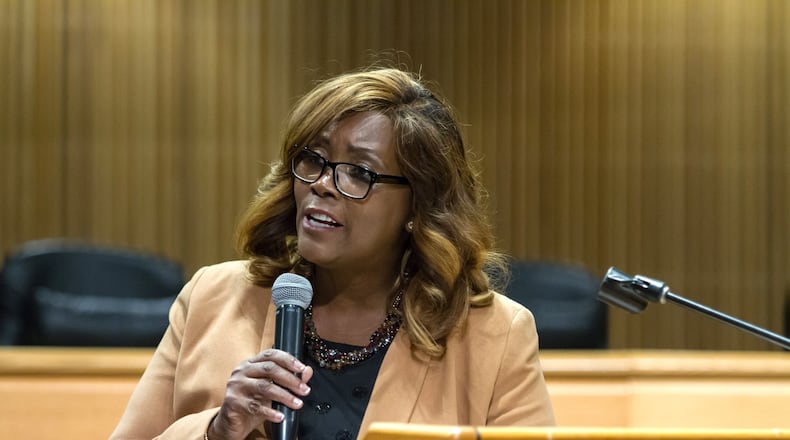Gwinnett’s 2011 update to its ethics ordinance was meant to restore public trust battered by a series of scandals involving county commissioners.
But since the update was passed, the two complaints filed haven’t had anything to do with bribery or a failure to disclose financial ties with people doing business with the County — the issues that prompted the rewrite and led three commissioners to leave office, two under indictment.
Instead, the most recent complaints have centered on speech, specifically whether commissioners’ statements violated requirements to use “earnest effort and best thought” and “never engage in conduct which is unbecoming” to their office.
The ethics board found commissioners Tommy Hunter and Marlene Fosque both violated those provisions.
The most recent decision against Fosque prompted Commissioner Ben Ku to question whether those provisions belong in the ethics code at all.
“They would be better put in a code of conduct,” he said. “I would like to see us update the code of ethics.”
For now, though, nothing is likely to change.
Commissioner Tommy Hunter has sued the county after commissioners agreed he violated the ethics ordinance by calling U.S. Rep. John Lewis a “racist pig” in a Facebook post that also referred to Democrats as “Demonrats” and a “bunch of idiots.” At least one other post referred to liberals as “libtards.”
Ku said he doesn’t expect anything to change while Hunter’s legal challenge is pending.
Commission Chairman Charlotte Nash declined to comment on the ordinance. So did Hunter, who referred questions to his attorney, Dwight Thomas, who did not respond to several phone calls seeking comment.
Commissioners reprimanded Hunter, though they elected not to punish Fosque for saying anti-illegal immigration activist D.A. King was “someone known for spewing hatred and bigotry and racism.”
Fosque made the comments after King participated in a panel discussion she organized to discuss 287(g), a controversial federal immigration program used by the county.
Sheriff Butch Conway invited King to participate in the panel to represent a pro-287(g) viewpoint. During a commission meeting a few days later, Fosque said she regretted that King had participated.
Fosque said she found the language of the ordinance “subjective” but thought violations could still be judged on a case-by-case basis. She said, though, such decisions could be difficult.
Others agree.
Edward Queen, a faculty member at Emory University’s Center for Ethics, said the provisions are ambiguous.
“It opens itself up to the possibility that ‘unbecoming’ is any type of behavior [they] don’t like,” he said. “I don’t think you should judge people by such an indefinite standard.”
Queen said he thinks it is appropriate for governments to have standards by which its members are expected to comport themselves. But Queen said policing language with no definitions is a problem, and he thinks the section was odd.
“People need to have some clarity about the nature of the standard,” he said. “It’s weird that it’s there in the way it is.”
Stacey Kalberman, the DeKalb County ethics officer, said she hadn’t heard of other jurisdictions with similar language in their ethics ordinances. Most are focused on conflicts of interest, she said, and using a government position for personal gain.
Gwinnett’s provisions create freedom of speech issues, Kalberman said, and putting that language into a code of conduct would eliminate ethics complaints that turned on subjective ideas about how people should act or their moral values.
“You could take that far beyond what anyone would think of as an ethics complaint,” Kalberman said. “It’s not typical.”
Steve Reilly, an attorney who represented Fosque in her ethics hearing, said there is similar language in the Uniform Code of Military Justice. But he said there’s a difference between requiring members of the military to avoid unbecoming conduct and asking elected officials to do so.
“It’s difficult to enforce that kind of standard out here in the civilian world,” he said.
About the Author






